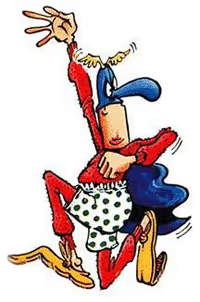The big ol' original musical debate
#75The big ol' original musical debate
Posted: 2/8/12 at 1:05pm
But I would argue that it is not a song-cycle. It has a clear plot that follows one character chronologically through a series of events in her life. She has musical conversations with people (though they don't appear on the same stage). I would even say that it's far more traditional than its authors even seem to think it is.
I will say that I see your point regarding this particular work. The rudimentary quality to the storytelling certainly calls into question the effectiveness of the plot. But I still come down on the side that there's enough there to make it a 'book' show.
#76The big ol' original musical debate
Posted: 2/8/12 at 4:39pm
This debate might be best resolved by looking at the four beloved nominees for the best musical tony 1968. By doing so we might best conclude that classic musicals - shows that enter the cannon - cover the spectrum of originality and derivation.
Two of 1968's best musical nominees were original. One explored famous historical events and characters, and is noted for having one of the most literate librettos in the history of the American musical. The other brought contemporary culture to vibrant life, ran for 1,750 performances and won a tony when it was revived in 2009.
Two were based on other media. One found inspiration in
a great oscar-winning movie. The other was based on a famous novel which had already been made into a popular film.
1776, Hair, Promises, Promises, and Zorba. The tony winner, 1776, was original. The most successful by far, Hair, was also original. Both of the originals have been filmed. All four have been revived and the fourth is slated to be revived again soon with Antonio Banderas (and, if they asked me for my advice, Sonia Braga).
Updated On: 2/8/12 at 04:39 PM
#77The big ol' original musical debate
Posted: 2/9/12 at 2:51amAnd what about Blood Brothers?
#78The big ol' original musical debate
Posted: 2/9/12 at 12:04pmPersonally, I think the Let Me Finish and Letters numbers in Tell Me on a Sunday are pretty clear indicators of a book. They guide the audience through the progression of relationships as well as indicate her change in locale throughout the show. There are very few truly bookless musicals. They are pretty much revues or song cycles with absolutely no plot in which the songs could be reshuffled in just about any order without affecting the theme of the show itself. Even Noise/Funk has a book as the chronology of the numbers are essential to the theme of the show, which is historical.
#79The big ol' original musical debate
Posted: 2/9/12 at 7:29pm
Don't understand why there's any debate about "Song" of "Song and Dance" being a book show. It's a book show about a young English woman in New York. End of story.
Someone else's story, Blood Brothers is loosely based on Alexandre Dumas pere's The Corsican Brothers. Perhaps it belongs to the West Side Story/Golden Apple/Lysistrata Jones/Seven Brides for Seven Brothers (although that might not exactly qualify depending on whether its viewed as taken from literary or historical sources - not to mention that in that case the musical film preceded the stage show)/The Fantastics school of pseudo-adaptations.
Gaveston2
Broadway Legend Joined: 6/28/11
#80The big ol' original musical debate
Posted: 2/9/12 at 7:40pm
I don't know about BLOOD BROTHERS, henrik, but all the others on your list announced themselves as adaptations. LYSISTRATA JONES includes the source material in its title. GOLDEN APPLE references one of the most famous events in Greek mythology. As you note, SEVEN BRIDES was either adapted from the film or from THE SOBBIN' WOMEN (I think that's the title).
They may go into a subcategory of "loose adaptations", but I think we have to take them at their word and accept that they were adapted. If we don't draw the line at the writers' own admissions, where would we ever draw it?
#81The big ol' original musical debate
Posted: 2/9/12 at 8:12pm
Good point Henrik--and Zorba wouldn't have happened without the movie. The novel WAS out in English before the movie but did not sell.
I do think that Tell Me On a Sunday/Song is more than the classical sense of song cycle--it tells a very clear story and that's one reason it has so much appeal (at least in the UK).
#82The big ol' original musical debate
Posted: 2/9/12 at 9:18pm
Gaveston I'm not sure if there was an official recognition but a google search shows many who cite Corsican Bros as a source for Blood Brothers. And for everyone's edification Gaveston is referring to The Rape of the Sabine Women (as famously told by Livy and Plutarch but perhaps more as history or legend than as story - thereby reopening our debate over whether turning to history is engaging in adaptation.... yawn!!!). The Golden Apple in comparison is not only immortalized in myth but in the narrative literary cannon, i.e. Homer.
Of course, if we were not going to consider the classical chronicles as sources for adaptation (loose or otherwise), we would probably have to do the same for the Bible. I would advise against that approach: accordingly, Home Sweet Homer, The Golden Apple, Olympus on my Mind, Seven Brides, etc., should have the same adaptive status as Godspell, Two by Two, Jesus Christ Supertar, Joseph and.... etc., although in some cases the adaptations are looser than others.
All of this is making me think about Forbidden Planet and The Tempest...
It's a matrix.
Updated On: 2/9/12 at 09:18 PM
Gaveston2
Broadway Legend Joined: 6/28/11
#83The big ol' original musical debate
Posted: 2/10/12 at 4:58pm
henrik, I was actually referring to Stephen Vincent Benet's THE SOBBIN' WOMEN, which I believe was adapted by THE SEVEN BRIDES screenplay. The Broadway musical credits both it and the film as adaptation sources, per IBDB. Yes, of course, Benet's WOMEN was itself an adaptation of Virgil, et al.
I hope you know I simply took your word re the CORSICAN BROTHERS. I don't know it or BLOOD BROTHERS (which has been embarrassing since a very close friend of mine was in the original London cast of the latter).
#84The big ol' original musical debate
Posted: 2/10/12 at 11:21pm
Oh, I didn't know about Sobbin' Women, Gaveston. It's funny. I have seen Blood Bros. but didn't know it was from Corsican - which I only know by name - until I Iooked it up online just the other day because I was curious re: someone else's question about it. I certainly didn't think my veracity was put in question by your post.
Good to learn new things. bww is like ken ken or sudoku, in a strange way it keeps your brain workingG
Gaveston2
Broadway Legend Joined: 6/28/11
#85The big ol' original musical debate
Posted: 2/11/12 at 5:19pm
It keeps YOUR brain working! Obviously.
I just had to right a correction in another thread because I mistakenly confused an essay written by Williams with one written by Miller. I suppose I should be grateful I realized my mistake, even if it took an extra day...
Videos






